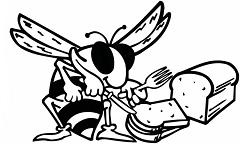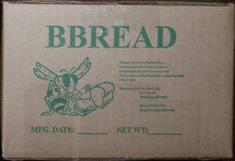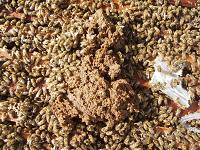Probiotic protein feed for Honey Bees
Contains: 24% protein
24% protein
This is the product we have been working on for the past 5 years.
My original idea was to turn normal pollen substitute patties into artificial bee bread by inoculating them with the proper microorganisms. We all know that fresh pollen has very short life span until it gets moldy and goes bad. Pollen substitutes have the same problem. Bees do not eat pollen, they eat bee bread. They add nectar to the fresh pollen and somehow it gets inoculated with beneficial microorganisms to turn it into what we call bee bread and this can be stored in the comb for up to two years. I had the idea that if I could turn our normal pollen substitutes into artificial bee bread that it would preserve them and make them last longer, make them more attractive to the bees, and maybe the microorganisms would start to digest and break down the substitutes and make them more digestible by the bees. I have not run scientific tests on these hypothesizes, but we have stored our artificial bee bread for over 6 months at room temperature and at the end of this period it was better than when we made it, and the product is definitely attractive to the bees. I also think the microorganisms increase the protein content (isn't brewer's yeast one of our favorite pollen substitutes).
Secondly, I decided that if a pollen substitute could have multiple ingredients instead of just one or two that it would be more likely to be more nutritionally balanced and better for the bees. So I started looking for different ingredients that might be used in addition to soy flour and brewer's yeast. My current formula has 8 ingredients.
With further study I found out that pollen grains (as picked up by the bee from the flower and not the balls that they make to transport pollen on their hind legs) were between 10 and 50 microns in size. Even finely ground flours normally have particles in them over 200 microns in size. These pollen grains and flour particles are hard. Imagine how difficult it would be for you to eat a baseball size chunk of solid sugar. I decided I could definitely make a better pollen substitute if I could micro grind my ingredients. Then I started checking on equipment. The prices got into 6 figures real fast, and that was only one step in making these protein patties. After a lot of research we finally found an economically feasible way of grinding BBread into particles smaller than 50 microns.
Next, soy flour and brewer's yeast are both almost 50% protein. That sounds good, but then I started trying to find out what the other 50% was. That is when I got worried. They are about 5% ash (vitamins and minerals) that was good, less than 10% water, nothing wrong with that, but what was the other 35% ? The best I can learn it is complex carbohydrates (cellulose, starch, complex sugars) and other things I think are indigestible by bees. We have always been told that bees can't digest complex sugars and starch. You have to be very careful with the sugar you feed them. The wrong sugar and you can kill your bees. Then we feed them pollen substitutes with large amounts of this stuff, and we wonder why they don't build up on it.
Not only do our ingredients contain much less starch, cellulose, and complex sugars to start with, but our process actually helps to break down the small amount that is in our initial ingredients and converts them to simple sugars.
Here are some other things I discovered. Good pollen is between 20% and 30% protein. That is what we need to strive for in our protein patties. More than that and the researchers say that it is not good for the bees. If we start with a 48% pollen substitute and add a little sugar to make a patty most of us would think we would be in that protein range. Before you buy patties again you might ask what the percentage of protein is in them, and are they figuring it on dry weight or total weight. Some of the pre made patties I've checked on are only about 7% protein, they are mostly sugar. When you ask they might tell you it is a "complete" food for bees. That makes it sound good, but personally I don't like to pay $1.00 plus per pound for sugar. The "dry weight" phrase is something else you want to look at. Lets say a patty is 20% protein by "dry weight" sounds good, but if it is 30% moisture, then it is really only about 14% protein. They don't sell it to you by the "dry weight." The pollen substitute should also have some cholesterol in it, vitamins and minerals, and a small amount of fat.
We have developed a patty that is over 22% total weight protein. This means there is a lot less "undigestible" particles in it. It contains needed vitamins and minerals, fat , and cholesterol. It is also about 30% simple sugars and 30% moisture. It is not as sticky as normal pollen patties and will dip out of a bucket with a scoop. The bees really like it.
Bbread also contains natural Xanthopylls, which are carotenoids that occur naturally in pollen. While no real research is available it is suspected that these substances increase the attractiveness of Pollen to bees as well as increase its nutritional value and acts as an immune defense.
Some other figures relevant to feeding: It takes one pound of pollen and 41/2 pounds of honey to raise 4500 bees according to Dr. Collision.
Some descriptions of what BBread is:
Pollen Substitute
Bee bread substitute
Proboitic protein feed for honeybees
We can't decide for sure what to call it.
What is it:
A protein honeybee feed made from multiple ingredients to make it more nutritionally balanced. It is over 20% protein, 40% simple sugars, 5% vitamins and minerals, 5% fat. It is fermented and contains live and active probiotics (beneficial microorganisms). It is not sticky like most pollen patties. It can easily be portioned out with an ice cream spade. Because of this we are packaging it in bulk containers to make it cheaper and so you can portion exactly what you feel each hive needs.
BBread
Introductory pricing: We want you to try it and we want your positive and negative feedback.
Up to 50 lbs.
 $2.25 per pound
$2.25 per pound
50 to 500 lbs
 1.75 per pound
1.75 per pound
over 500 lbs
 1.50 per pound
1.50 per pound 



BBREAD
Jester Bee Company



BBREAD